简明语言学教程 Chapter_7_Change ppt
新编简明英语语言学教程 第二版 戴炜栋7 Language Change
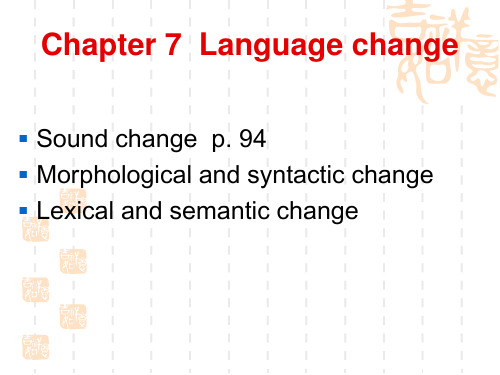
Meaning shift
inn: a small, old hotel or pub well-known, nice hotel nice: ignorant (1000 years ago) good, fine lust: pleasure with negative and sexual overtones silly: happy naï ve, foolish
Some recent trends
Moving towards greater பைடு நூலகம்nformality The influence of American English
The influence of science and technology
The influence of science and technology
Changes in the meaning of words
Widening of meaning Narrowing of meaning Meaning shift
Widening of meaning
holiday: [+specific] holy day [+general] any rest day [+specific] tail of a horse [+general] tail of any animal
Simplification & elaboration/ complication coexist, e.g. The disappearing of case ending results in rigid sentence structure.
Syntactic change
简明英语语言学教程 Chapter 7
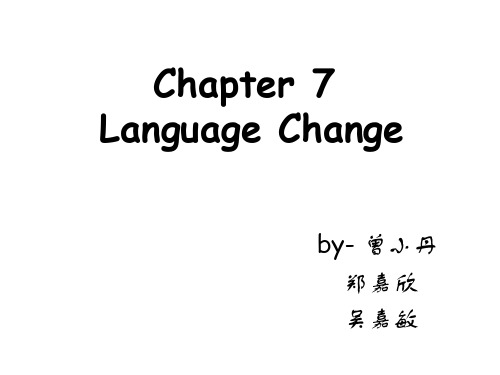
• Children's acquisition of language is quickly and effortlessly. It seems that their acquisition process is simple and straightforward . • In the learning of language , children's grammar is never exactly like that of the adult community . • Language has a lot of dialects and many individual styles.The features of these grammers may the merge(合并)----lead to certain rules of language may be simplified or overgeneralized.
• The reasons for some changes are relatively obvious. For example, the rapid development of science and technology has led to the creation of many new words.Such as bullet train ,laser printer,CD-ROM , laptop computer, iphone. • Social and political changes and political needs have supplied the English vocabulary with a great number of new words and expressions: shuttle diplomacy,mini-summit,jungle war,Scientific Outlook on Development • Some other words have also changed as women have taken up activities formerly reserved for men .
语言学教程Chapter 7. Language, Culture, and Society(课堂PPT)
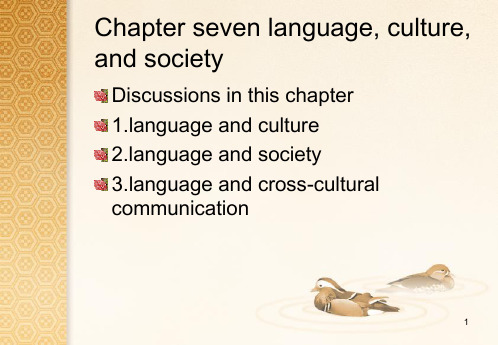
Anthropological linguistics
A branch of linguistics which studies the relationship between language tradition, beliefs, and family structure. 语言学的一个分支,研究一个社团的语 言和文化之间的关系,如传统、信仰和 家庭结构。
14
Ethnography of communication
The study of the place of language in culture and society. Language is not studied in isolation but within a social and/ or cultural setting. Ethnography of communication studies, for example, how people in a particular group or community communicate with each other and how the social relationships between these people affect the type of language they use.
8
Speech act theory
Language is a mode of action This view of language is the basis for the generation of the speech act theory.
9
Contribution by Malinowski
Paved the way for a cultural, rather, a contextual study of language use in Britain.
《新编简明英语语言学教程》PPT课件

Chomsky’s definition (1957)
“From now on I will consider language to be a
set of (finite or infinite) sentenБайду номын сангаасes, each finite in length and constructed out of a finite set of elements.”
• • • • •
Arbitrariness Productivity/Creativity Duality Displacement Cultural transmission
Arbitrariness
----No logical (motivated or intrinsic) connection between sounds and meanings. Onomatopoeic words (which imitate natural sounds) are somewhat motivated ( English: rumble, crackle, bang, …. Chinese: putong, shasha, dingdang… ) Some compound words are not entirely arbitrary, e.g. type-writer, shoe-maker, air-conditioner, photocopy…
Language is arbitrary
Arbitrary---- no intrinsic connection between the word and the thing it denotes, e.g. “pen” by any other name is the thing we use to write with.
新编简明英语语言学教程CH7

Language change is essentially a matter of change in the grammar, including changes in the sound, morphological, syntactic, lexical, and semantic systems.
Sound addition includes the gain or insertion of a sound. A change that involves the insertion of a consonant or vowel sound to the middle of a word is known as epenthesis 插音 , for example:
by WU Gengtang 广东技术师范学院 2011年 Copy Left
systematic; regular pattern of pronunciation changes
a) Vowel sound change
Great Vowel Shift元音大换位, which occurred at the end of the Middle English period, approximately between 1400 and 1600 and which involved 7 long vowels, led to one of the major disagreements between the pronunciation and the spelling system of Modern English.
by WU Gengtang 广东技术师范学院 2011年 Copy Left
语言学导论-第7章Language change

Middle English (1100-1500)
in 1066 William the Conqueror, the Duke of Normandy linguistic class division
lower classes English upper classes French
Semantic broadening
holiday: [+specific] holy day [+general] any rest day tail: [+specific] tail of a horse [+general] tail of any animal
Semantic narrowing
Addition of new words Loss of words Semantic changes
Addition of new words
coinage clipped words blending acronyms back-formation functional shift borrowing
Coinage
----A new word can be coined outright to fit some purpose E.g.,
Kodak Benz
Clipped words
----The abbreviation of longer words or phrases E.g.,
Addition of affixes
-ment: from French -dom: from the word dōm (Fusion)
Loss of affixes
简明法语教程 第7课
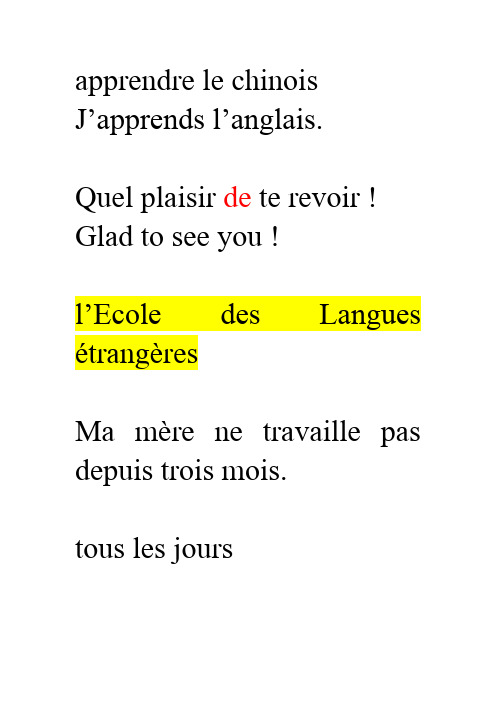
apprendre le chinoisJ’apprends l’anglais.Quel plaisir de te revoir ! Glad to see you !l’Ecole des Langues étrangèresMa mère ne travaille pas depuis trois mois.tous les joursOn va au cinéma samedi. On va au cinéma le samedi. Est-ce que le français est difficile ?Le français est-il difficile ? La fille est-elle belle ?c’est pourquoidu matin au soiraprès les coursfaire des exercices beaucoup de+n.(省冠词) beaucoup d’exercicesbeaucoup de livresfaire des progrès remarquablesprès de...loin de...chez qnà piedil va à la société à pied.en dix minutesfaire la toiletteprendre le petit déjeunerle déjeunerle dînerJe prends le petit déjeuner. partir de la maisonje pars nous partonstu pars vous partezil part ils partent arriver à la classerester à la maisonsix heures du matinsix heures de l’après-midi neuf heures du soirJe déjeune àla cantine àmidi.à minuitrentrer fairedevoir fairealler fairevenir faireJe vais voir mes parents.Il vient apprendre le chinois. Il rentre dîner.à côté de...à la maisonse réveillerse leverse couchers’endormiren quinze minutesen un quart d’heureNous apprenons le français depuis bienôt six mois. Mon père travaille dans unegrosse société, il se lève tôt le matin, il se couche à onze heures du soir, c’est pourquoi il est fatigué.Quel plaisir de te voir !Le français est difficile, mais nous écoutons (souvent) des enregistrements et faisons des exercices. Wang Hong apprend l’anglais à l’Ecole desLangues étrangères. Elle y habite, elle rentre àla maison le samedi.rentrer à la maisonJe me lève à7 heures du matin. D’abord, je fais ma toilette, ensuite, je prends mon petit déjeuner, je vais àl’école.Que fait Michel ?Quel âge a-t-il ?Où est-ce qu’il habite ?Où habite-t-il ?Est-il marié ?Est-ce qu’il est marié ?Où travaille-t-il ? Comment va-t-il au bureau ?A quelle heure se lève-t-il ? Avec qui dîne-t-il ?限定词:不定冠词:un ,une,des 定冠词:le,la,les主有形容词:mon,ton... 指示形容词:ce,cet,cette,cesaller à la classe aller à Pékin。
语言学教程Chapter 7. Language, Culture, and Society(课堂PPT)

Anthropological linguistics
A branch of linguistics which studies the relationship between language and culture in a community, e.g. its tradition, beliefs, and family structure. 语言学的一个分支,研究一个社团的语 言和文化之间的关系,如传统、信仰和 家庭结构。
22
Prediction
Linguistic studies in the new century will become more fruitful if an evolutionary, cognitive, and interdisciplinary perspective is taken in its theoretic pursuit.
Paved the way for a cultural, rather, a contextual study of language use in Britain.
10
His influence
Under his anthropological view of language and being fully aware of the importance of the context in the study of language use, Firth, a leading figure in a linguistic tradition later known as the London school, tried to set up a model for illustrating the close relationships between language use and its co-occurrent factors. He developed
语言学教程Chapter Seven

language and culture, Language and society,
and language and cross-cultural communication.
2
7.1 language and culture What is culture? Broadly speaking, it means the total way of life of a people, including the patterns of belief, customs, objects, institutions, techniques, and language. In a narrow sense, it refers to local or specific practice, beliefs or customs. 7.1.1 The relationship between L & C There exists a close relationship between language and culture, generally, a relation of part to whole, for L is part of C. Language is an indispensible carrier of culture. The knowledge and beliefs that constitute a people’s culture are habitually encoded and transmitted in L. Culture finds a better representation through language use. Language and culture correlate with each other at different levels of linguistic structure.
Chapter Language Changeppt课件

Chapter 7 Language Change
语言演变/演化
2
7.1 Introduction
What is historical linguistics? (历史语言学)
3
7.2 Phonological changes
1. True or False: Not all aspects of language’s phonology are subject to change over time.
7.5.1 Moving towards greater informality 7.5.2 The influence of American English 7.5.3 The influence of science and technology
14
7.6 The causes of language change
11
7.4.2 Lossห้องสมุดไป่ตู้of words
12
7.4.3 Semantic changes
1. semantic broadening: examples 2. semantic narrowing: examples 3. semantic shift: examples
13
7.5 Some recent trends
1. With examples, give plausible explanations for linguistic changes.
此课件下载可自行编辑修改,供参考! 感谢您的支持,我们努力做得更好!
15
8
7.3.4 Change in negation rule
9
语言学教程课件7 Language, Culture, and Society
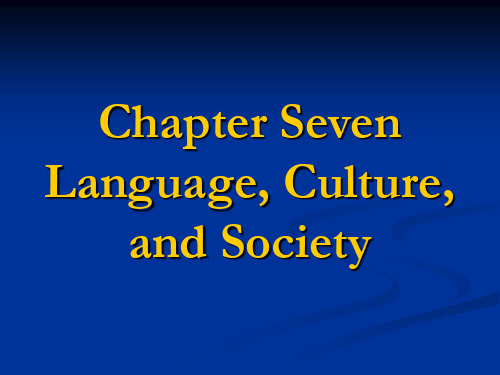
In Hopi, an American Native language, there seems to be no concept of time, and there is no words about speed.
He runs fast can be interpreted literarily as He very runs.
what end”
Hymes: Ethnography of communication 1. Speech situation. 2. Situation, event, and act. 3. SPEAKING: situation, participants, ends,
act sequence, key, instrumentalities, norms, and genres
Linguistic evidence of cultural differences Terms of address Greetings Thanks and compliments Privacy and taboos Color words
English: horseshoe French: fer a cheval —— iron for horse German: hufeisen—— hoof iron The Eskimos have countless words for snow.
Extreme opposition to universalism. Universalists argue that we can say whatever we want to say in any language, and that whatever we say in one language can always be translated into another.
简明语言学教程 Chapter_7_Change ppt
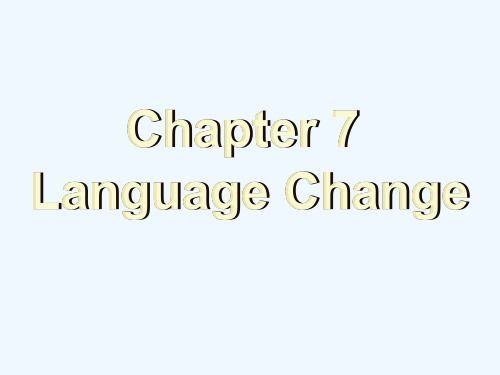
Sound/phonological change: systematic; regular pattern of pronunciation changes
a) Vowel sound change Great Vowel Shift元音大换位, which occurred at the end of the Middle English period, approximately between 1400 and 1600 and which involved 7 long vowels, led to one of the major disagreements between the pronunciation and the spelling system of Modern English. For example: Middle English Modern English Five fi:v faiv mouse mu:s maUs feet fe:t fi:t mood m : d mu:d break br Z : ken breik broke br C: ken br EU k Name na:me neim
Sound Change
The Great Vowel Shift
i: ai au u:
əu
ei e Mice [mi:s] [mais]s] [maus]
b) Sound loss Some sounds in English have simply disappeared from the general pronunciation of English. -----the voiceless velar fricative / x /, "nicht" /nixt/ night sorh /sorx/ sorrow ----- /k/ sound in /kn - / clusters in the word initial position "knight“ "knee" -----Another sound loss is the deletion of a word-final vowel segment, a phenomenon called apocope.词尾脱落 /na:mə / / neim/ /l Q və/ /l Q v/
新编简明英语语言学教程第7章LanguageChange
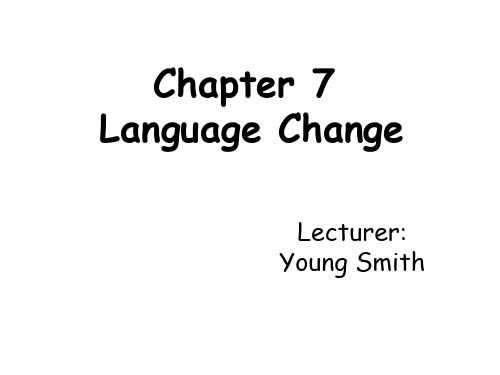
All languages change with time
• Language is like a living organism, it may change and grow, but rather slowly 1、Sound (Phonological) change 语音变化 2、Morphological and synatctic change 形态变化和句法变化 3、Lexical and semantic change 词法和语义变化
1500-year history of English
• Old English [450---1100 A.D] just as difficult as another language, unintelligible • Middle English [1300—1400] more like modern English (Chaucer’s time), need special instruction • Early Modern English [1500—1600] (Shakespeare’s time) need help, word order, meanings • Modern English [1700---1900] • Contemporary English [the past 50 years] (The Encyclopedia Britannica Yearbook: a list of words that have entered the language during the year)
To riden out, he loved chivalrie, Trouthe and honour, fredom and curteisie A knight there was and that a worthy man That from the time that he first began To ride our, he loved chivalry(骑士气概), Truth and honour, freedom and courtesy. (2) Whan that Aprille with his shoures sooth When that April with his showers sweet…
- 1、下载文档前请自行甄别文档内容的完整性,平台不提供额外的编辑、内容补充、找答案等附加服务。
- 2、"仅部分预览"的文档,不可在线预览部分如存在完整性等问题,可反馈申请退款(可完整预览的文档不适用该条件!)。
- 3、如文档侵犯您的权益,请联系客服反馈,我们会尽快为您处理(人工客服工作时间:9:00-18:30)。
Vowel raising, Vowel fronting, Diphthongization
Sound/phonological change: systematic; regular pattern of pronunciation changes
b. Middle English中世纪英语 (1066-1500) Chaucer, Shakespeare
c. Modern English 现代英语 (1500-present)
Introduction
It is a fact that all languages change through time, though they do so rather slowly.
Middle English Modern English
Five
fi:v
faiv
mouse mu:s
maUs
feet
fe:t
fi:t
mood m : d
mu:d
break br Z : ken
breik
broke br C: ken
br EU k
Name na:me
neim
Sound Change
① the identification of the changes enables us to reconstruct the linguistic history of that language, hypothesizes its earlier forms.
② it also enables us to determine how non-linguistic factors, such as social, cultural and psychological factors, interact over time to trigger linguistic change.
The most dramatic change that English underwent included the vowels as illustrated in the examples. (P. 94)
Sound Change
The Great Vowel Shift was a major change in the pronunciation of the English language that took place in England between 1350 and 1500.
沛公旦日从百余骑来见项王,至 鸿门,谢曰:“臣与将军戮力而攻秦, 将军战河北,臣战河南,然不自意能 先入关破秦,得复见将军于此。今者 有小人之言,令将军与臣有郤(xì) (同“隙”,隔阂。)。”项王曰: “此沛公左司马曹无伤言之;不然, 籍何以至此?”项王即日因留沛公与饮。 《史记》
Phonological changes
Among all the changes in language, either subtle or obvious, changes at phonological level are particularly noticeable and varied. Some common types of sound changes can be distinguished and recognized, which makes it possible to work out patterns of pronunciation changes throughout the history of the English language.
Sound Change Morphological & Syntactic Change Lexical Change & Semantic Change Causes of the Language Change Exercises
Introduction
a. Old English古 代英语 (449-1066) Beowulf, an Anglo-Saxon epic poem, the most important work of Old English literature
L Change (Historical linguistics)
Historical linguistics is the a branch of linguistics, is mainly concerned with both the description and explanation of language change. Diachronic linguistics
The Great Vowel Shift
i: ai
au
u:
əu
ei
ɔ
e a:
Mice [mi:s] [mais]
Mouse [mu:s] [maus]
b) Sound loss
Some sounds in English have simply disappeared from the general pronunciation of English.
a) Vowel sound change
Great Vowel Shift元音大换位, which occurred at the end of the Middle English period, approximately between 1400 and 1600 and which involved 7 long vowels, led to one of the major disagreements between the pronunciaystem of Modern English. For example:
